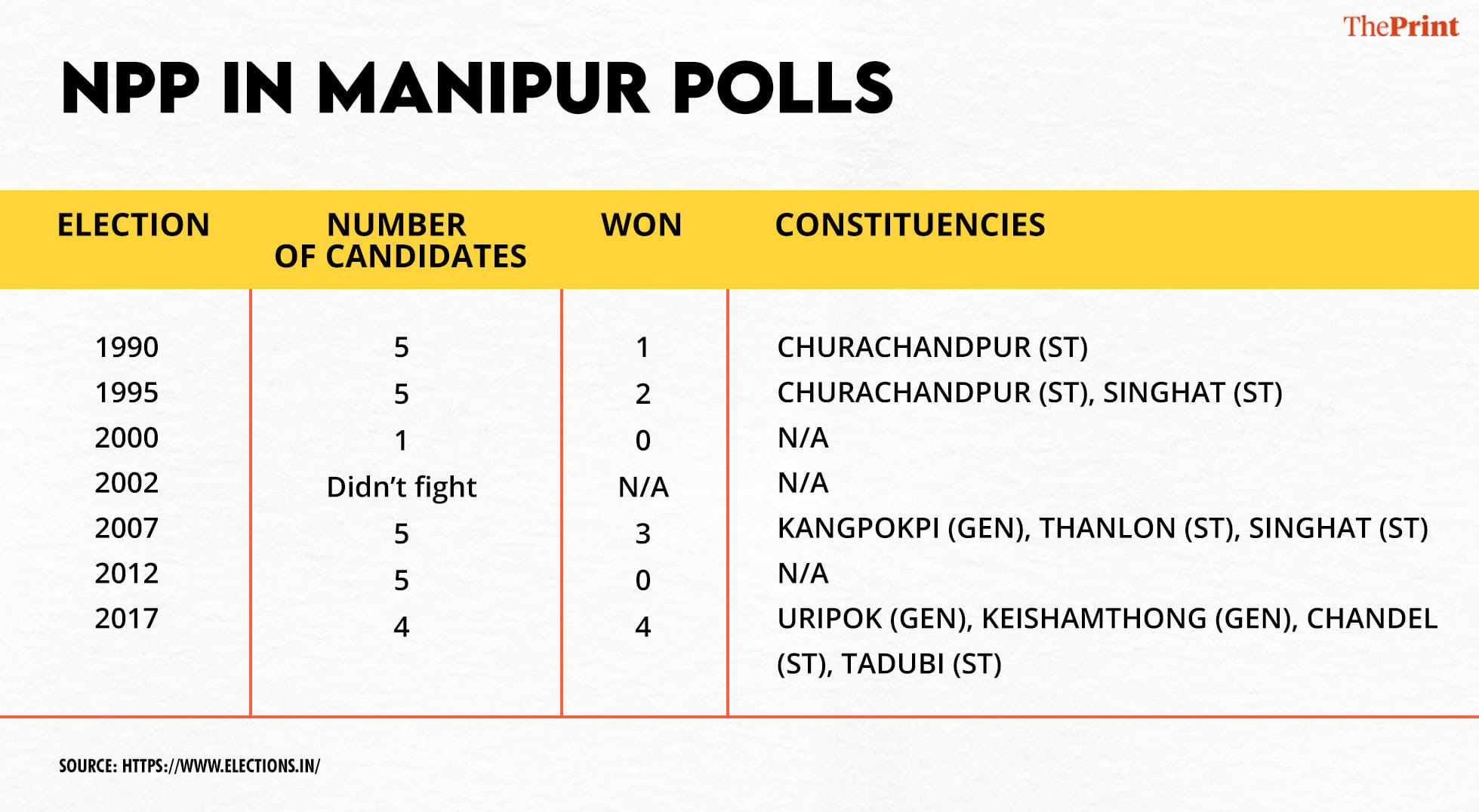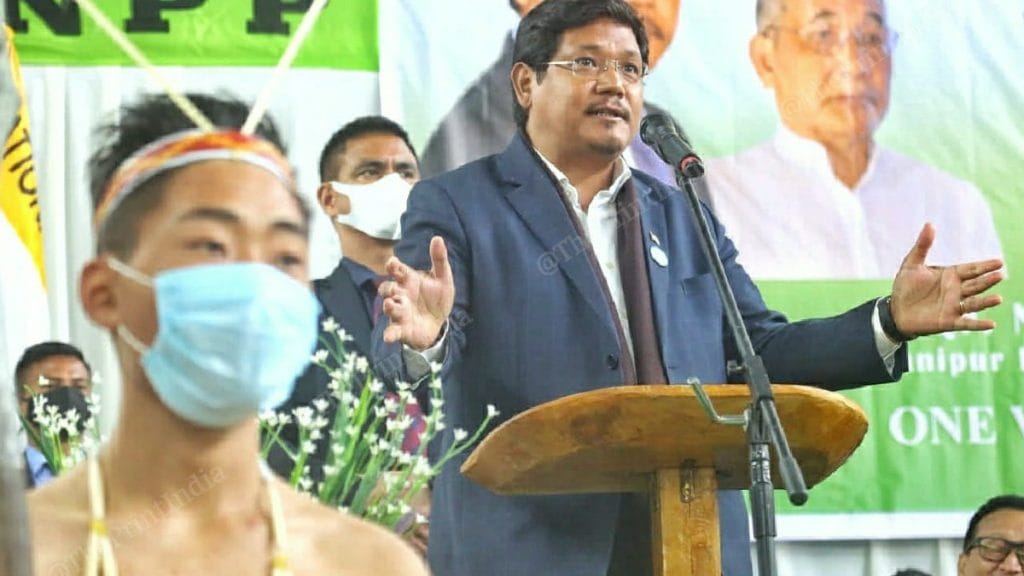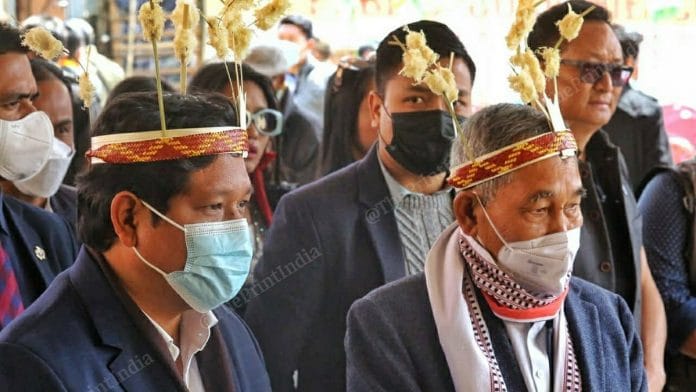Ukhrul/Imphal: One of the Bharatiya Janata Party’s (BJP) key competitors in Manipur is its National Democratic Alliance (NDA) partner National People’s Party (NPP).
The party, led by Meghalaya Chief Minister Conrad Sangma, which was declared the eighth national party in India by the Election Commission in 2019, has made its ambitions clear in Manipur, by contesting 38 of the 60 assembly seats this time, compared to the nine seats it contested in the 2017 polls.
This is significant because the NPP and BJP are currently part of the ruling coalitions in Meghalaya, Arunachal Pradesh and Manipur itself. The NPP is also a part of the BJP-led Northeast Democratic Alliance (NEDA).
In Meghalaya, the BJP is part of Sangma’s NPP-led government, while in Arunachal Pradesh, the roles are reversed, and it is the BJP which is the senior partner.
In the outgoing Manipur assembly, the NPP had four MLAs, till Letpao Haokip quit the NPP and joined the BJP in the build-up to these polls. But the party has been a key part of the government led by the BJP’s N. Biren Singh. In fact, its senior leader Yumnam Joykumar Singh is the deputy CM.
According to Sangma, the NPP’s decision to fight its ally in Manipur is a way to deliver a message from the Northeast that New Delhi will listen to.
“What we are trying to tell everybody is that the people of the Northeast must realise that we need to come together to be able to send a message, for which we will need a political platform. If the Members of Parliament from the Northeast come together, Delhi will have to listen,” said Sangma last week, addressing a packed auditorium in Ukhrul, before an audience that came predominantly from the Tangkhul Naga community, a dominant tribal group.
ThePrint explains the NPP’s journey in Manipur, its rocky ties with the BJP, and how it’s likely to fare in the upcoming polls.
Also read: The five factors that determine politics and voting behaviour in Manipur
NPP’s 33-year history in Manipur
The NPP manifesto claims that the party’s aim is “to address the necessity of having a common agenda and raising a collective voice for issues and concerns vis-a-vis the people of the Northeast.”
The party was formed in 1989, and at a meeting convened by Brajamohan Dev Sharma Mandap in Uripok, Nongthombam Ibomcha Singh was elected its president.
Just a year after it was formed, the NPP fought five seats in Manipur and won in Churachandpur, with V. Hangkhanlian becoming the first NPP MLA and minister in the R.K. Ranbir Singh-led government.
The NPP went on to fight in the 1995, 2000, 2007, 2012 and 2017 elections, skipping 2002. It won two seats in 1995, three in 2012 and four in 2017, while drawing a blank in 2000 and 2012.
In 2013, the party was formally taken over by P.A. Sangma, the former Lok Sabha Speaker, who had broken away from the Sharad Pawar-led Nationalist Congress Party (NCP).

At the time, Sangma had said, “Though the party is meant for all and its membership is open for everyone, it is going to be tribal-centric.”
Over the years, the NPP has mostly won on Manipur’s hill seats. But in 2017, it bagged two seats in the hills and two away from them.
Also read: Defections, flailing leadership, pockets of hope — how Congress ‘khubak’ declined in Manipur
Beginning of issues with the BJP
When the 2017 elections resulted in a hung assembly, with the Congress emerging as the single largest party with 28 seats (still three shy of the required 31), the BJP which had 21 seats, stitched together an alliance with Naga People’s Front (4), NPP (4) and the Lok Jan Shakti Party (1) to form the government.
At the time, Conrad Sangma, who had taken over the party’s reins following his father’s demise, said that since NPP was in an alliance with the BJP, it was “natural” for the parties to work with each other in Manipur.
All the four NPP MLAs, Joykumar Singh, Letpao Haokip, Jayantakumar Singh and N. Kayisii were appointed to the cabinet. Joykumar Singh, a former DGP of the state, was made the deputy CM.
However, the ties between BJP and NPP started getting strained within a couple of years.
“They [the BJP] had started questioning why all the four NPP MLAs were in the cabinet. They had also forgotten that it was us who had helped them form the government,” Joykumar Singh told ThePrint.

Trouble began in April 2020, after Joykumar Singh was stripped of all his portfolios for allegedly making a controversial remark against CM Biren Singh over rice distribution during the Covid-19 pandemic. A month later, NPP MLAs withdrew their support from the government.
“We quit the coalition and went with the Congress, and also called for a no-confidence motion. Unfortunately, the Congress too couldn’t keep their flock together,” Singh said.
Eventually, after Union Home Minister Amit Shah’s intervention and talks between Assam Chief Minister Himanta Biswa Sarma and Conrad Sangma, the four MLAs rejoined the coalition government. However, two NPP MLAs were removed from ministership in a cabinet reshuffle in September 2020.
ThePrint approached Chief Minister Biren Singh and BJP minister Biswajit Thongam for a response to the NPP’s allegations, but received no response.
However, Union Minister Bhupendra Yadav, who is overseeing the elections in Manipur for the BJP, in an earlier interview with ThePrint, denied that the relations between the coalition partners had run into rough waters.
“No, that is not the right deduction. Over five years, we worked hard and earned people’s goodwill, so we decided to go it alone. But our relationship with our allies hasn’t been impacted,” he had said.
Conrad Sangma had also told ThePrint that a post-poll alliance with the BJP would depend on the outcome of the polls.
But the NPP’s rivalry with the BJP goes beyond Manipur. In Meghalaya too, where the two parties are in alliance, the parties have contested against each other in the last round of bypolls in the state.
In an Off The Cuff conversation with ThePrint Editor-in-Chief Shekhar Gupta, Sangma had stated that the BJP is yet to “understand the dynamics of the Northeast”.
“If you know a party like BJP is able to adapt and understand the dynamics of Northeast and give that space and that flexibility, then maybe we’ll see that kind of thing happening. But in all likelihood, it may not happen,” he had said.
Also read: Congress open to alliance with BJP’s partner & Manipur rival NPP, says ex-CM Ibobi Singh
‘One Northeast, one voice’
The strained ties between the BJP and the NPP became more evident after the Biren Singh-led party decided to field candidates on all 60 seats. Recently, Assam CM Himanta Biswa Sarma said the National People’s Party had no value and votes for its candidates would go to waste.
NPP leaders, however, believe that it has a strong chance this time.
Joykumar Singh said they decided to fight 38 seats this time, including 11 in the hill areas and the other 27 in Imphal and the other non-hill areas of the state because people are fed up of the BJP.
“I’ve seen that people are getting fed up with the BJP government. The Congress is not also there. People like it when we say ‘One Northeast, One Voice’… Our presence and popularity has also grown,” Singh said.
The party in its manifesto as well as its campaign, stresses on this ‘One Northeast, One Voice’ agenda. Its leaders have repeatedly asserted that only a consolidated political power from the Northeast will be able to lobby for the region’s interests in Delhi. Sangma, in a rally, described the NPP as a party that is not only “made for the Northeast” but also “made in the Northeast”, an implicit reference to the Delhi-run parties like BJP and the Congress.

Also mentioned in the manifesto is its promise to bridge the hill-valley divide in Manipur, and to work towards the repeal of the Armed Forces Special Powers Act.
“It’s not about politics. It (AFSPA) is a genuine issue and we, as leaders of a political party and the public, feel that the AFSPA in today’s situation is not at all necessary,” Sangma told ThePrint.
Ratika Yumnam, Joykumar Singh’s daughter and the NPP Youth president, said the decision to increase the number of candidates was made after the Lok Sabha elections. She said their focus was initially not on the tribal-dominated hill areas of the Outer Manipur Lok Sabha constituency, and over time, the the Naga People’s Front had more strength in this part.
“But we found (in the Lok Sabha elections) that there was actually a lot of preference for NPP. While we were campaigning in those areas, we found that it was specifically the young crowd that wanted us,” she said.
Another factor behind the NPP’s expansion seems to have been the BJP’s announcement of its candidate list, which led to widespread discontent in its ranks. Before this, the NPP had declared 20 candidates, but soon, two more lists of candidates followed, including many disgruntled names from the BJP.
According to Joykumar Singh, 60 or 70 per cent of the candidates who joined them from the BJP stand a good chance at winning. The NPP, overall, expects to emerge as the single largest party with 20 seats, and speculation is rife about an alliance with the Congress. That party’s leader, former CM Okram Ibobi Singh, has also stated that it will not be averse to allying with “like-minded” parties like the NPP.
Pradip Phanjoubam, political observer and editor of the Imphal Review of Arts and Politics, said there was indeed a marked change in the political equations.
“Once upon a time, we thought it was going to be a cakewalk for the BJP because they are the ruling party at the Centre and in the state. But now, after the BJP vote bank broke down at the time of distribution of tickets, the equation has changed considerably,” Phanjoubam said.
(Edited by Manoj Ramachandran)
Also read: Biren Singh did good work in Manipur, BJP’s call on CM always democratic, says Bhupender Yadav






